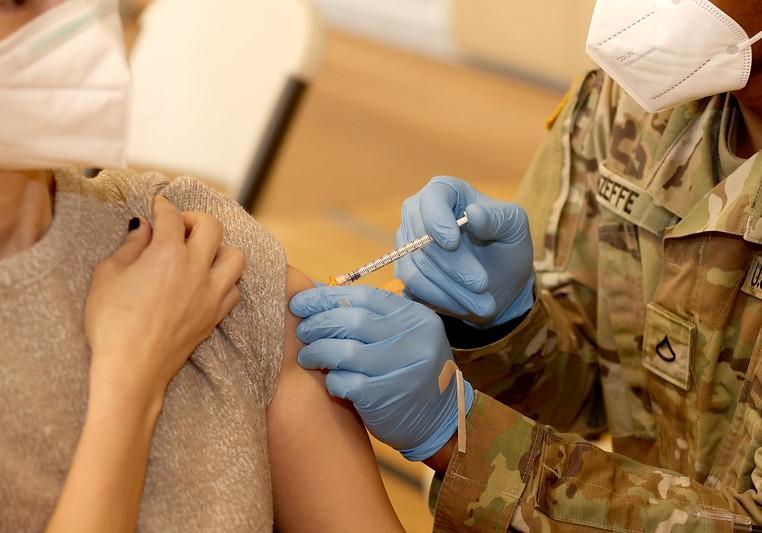First and second COVID-19 vaccine booster doses conferred substantial protection against emergency department/urgent care (ED/UC) visits and hospitalizations caused by infections with the Omicron subvariants BA.1, BA.2, and BA.2.12.1, finds a study of adults in 10 US states published late last week in Morbidity and Mortality Weekly Report.
The Centers for Disease Control and Prevention (CDC) COVID-19 Emergency Response Team led the study of 214,487 ED/UC visits and 58,782 hospitalizations with COVID-like illness from Dec 18, 2021, to Jun 10, 2022, to compare the vaccine effectiveness (VE) of two, three, and four mRNA COVID-19 vaccine doses (Pfizer/BioNTech or Moderna) or no vaccination against Omicron subvariants in adults with healthy immune systems.
The BA.1 surge in the United States occurred from December 2021 to February 22, after which the BA.2/BA.2.12.1 surge began (BA.4 and BA.5 became dominant in June 2022). The study didn't involve genetic sequencing of the causative subvariants but rather presumed the lineage from the dominant circulating strain at the time of diagnosis.
Currently, a two-dose primary COVID-19 mRNA vaccination series and a third (booster) dose at least 5 months later is recommended for all adults with healthy immune responses. On Mar 29, 2022, a fourth dose (second booster) was authorized for those 50 and older and those 12 and older with moderately or severely compromised immune systems at least 4 months after the third dose.
Efficacy against ED/UC visits
Of the 214,487 ED/UC visits with a COVID-like illness diagnosis, 57.8% occurred during the BA.1-dominant era, when 32.9% of patients tested positive for COVID-19, and 42.2% of infections occurred during the BA.2/BA.2.12.1-dominant period, when 11.3% tested positive.
During the BA.1 period, 41.4% of ED/UC patients were unvaccinated, 32.3% had received two vaccine doses, and 26.3% had received three. Amid BA.2/BA.2.12.1, 30.9% of ED/UC patients were unvaccinated, while 25.0% had received two mRNA vaccine doses (Pfizer/BioNTech or Moderna), 39.6% had received three doses; and 4.5% had received four doses.
Relative to two doses, receipt of three doses was linked to a higher VE against an ED/UC visit during both subvariant periods, and VE was higher during BA.1 than during BA.2/BA.2.12.1 period. Amid BA.1, VE against an ED/UC visits among participants of all ages fell to 73% 120 days or more (median 132 days) after the third vaccine dose, while it dropped to 26% at the same time-point (median, 166) after the third dose amid BA2/BA.12.1.
Among participants aged 50 or older, VE against ED/UC visits amid BA.2/BA.2.12.1 was 32% 120 or more days (median, 170 days) after the third dose but rose to 66% at least 7 days (median, 28) after the fourth dose.
Efficacy against hospitalization
During BA.1, 41.6% of all patients hospitalized for COVID-like illness were unvaccinated, 28.5% had received two vaccine doses, and 29.9% had received three. Amid BA.2/BA.2.12.1, 28.6% of patients were unvaccinated, 23.4% had received two doses, 42.9% had received three doses, and 5.1% had received four.
Of the 58,782 COVID-19 hospitalizations, 60.2% occurred during BA.1, when 29.8% of patients were infected, while 17.9% occurred during BA.2/BA.2.12.1, when 6.7% patients tested positive.
At least 150 days (median, 289 days) after the second vaccine dose, VE against COVID hospitalization was 61% amid BA.1, versus 24% during BA.2/BA.2.12.1 after a median of 371 days.
During BA.1, estimated VE against COVID-19 hospitalization in adults of all ages was 92% (95% confidence interval [CI], 91% to 93%) and 85% 7 to 119 days and 120 or more days (95% CI, 81% to 89%) after a third vaccine dose, respectively. Amid BA.2/BA.2.12.1, VE against hospitalization during the same periods was 69% (95% CI, 58% to 76%) and 52% (95% CI, 44% to 59%), respectively, after the third dose.
Among adults 50 years or older, VE against COVID-19 hospitalization was 55% (95% CI, 46% to 62%) 120 or more days after the third dose, rising to 80% 7 or more days (median, 27 days) after a fourth dose.
Researchers: Get boosted as soon as eligible
"The findings of this study are important because they provide an answer to a question that many people are asking: 'Should I get the second booster shot?'" coauthor Shaun Grannis, MD, of the Regenstrief Institute said in a Regenstrief Institute news release.
"The data clearly show that a second booster significantly increases vaccine effectiveness against these variants—which while no longer dominant in many areas, are still present."
The authors called for continued surveillance of circulating variants and subvariants and urged COVID-19 vaccination for all.
"Immunocompetent persons should receive recommended COVID-19 booster doses to prevent moderate to severe COVID-19, including a first booster dose for all eligible persons and a second dose for adults aged ≥50 years at least 4 months after an initial booster dose," they wrote. "Booster doses should be obtained immediately when persons become eligible."
The benefits of vaccination go beyond the protection of the vaccine recipient, Grannis said: "From a population health perspective, the protection supplied by the second booster helps ensure that healthcare resources are capable of responding to the full spectrum of medical needs, reducing the chance of overwhelming health systems with COVID-19-related disease."






















